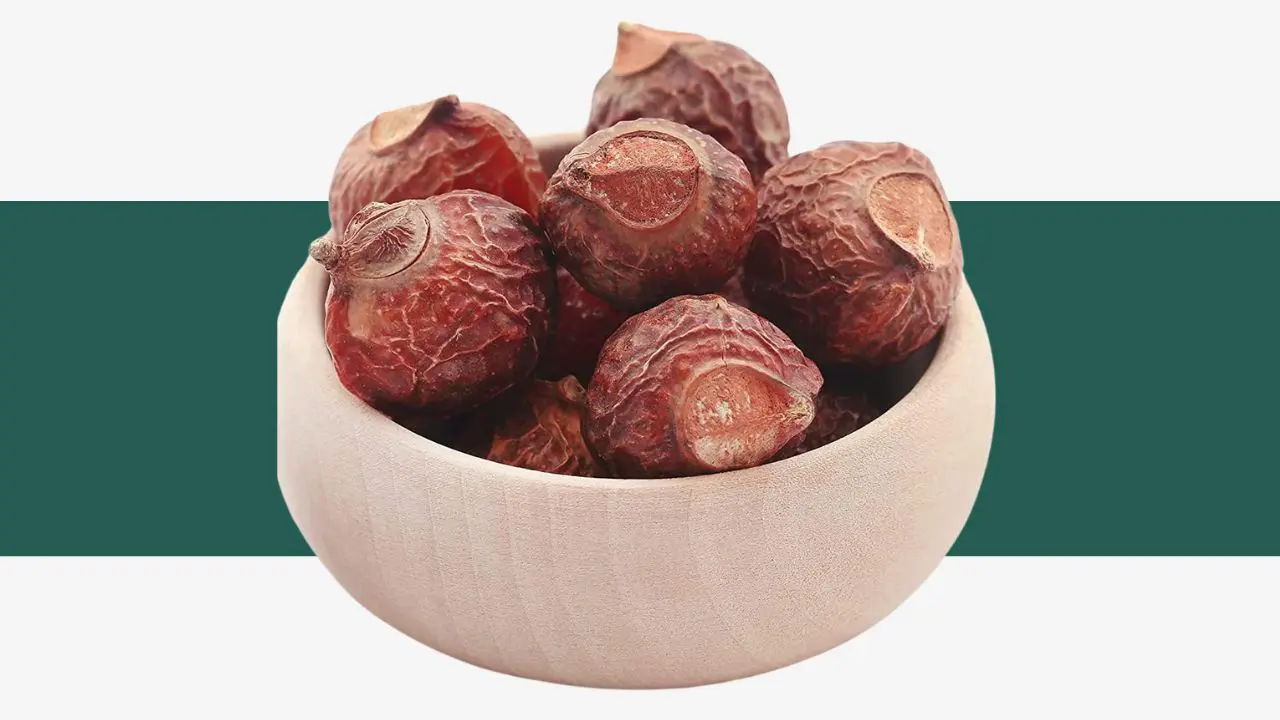Detergent footprint is a grave threat to our ecosystem. From toxic chemicals like nonylphenol infiltrating water bodies to disrupting delicate ecosystems and bio-accumulating in the food chain, the repercussions of our weekly laundry are dire.
Now you’re wondering: what’s the alternative? Turns out, there are plenty. In this article, we’ll talk about soap nuts.
Derived from a non-toxic, biodegradable, sustainably sourced berry, soap nuts cleaning solution is an affordable and eco-friendly alternative to the chemical-laden detergents and harsh cleaners we have in the market.
If you’re interested in learning about an effective and sustainable cleaning option for your everyday clothes that’s also kinder to the planet – keep reading.
What Are Soap Nuts?

Small, berry-like fruits called soap nuts, or soapberries, come from the ancient Sapindus trees that are found in abundance all over Asia. Because of their inherent saponin content, which functions as a mild yet powerful cleanser, these nuts have been used as a cleaning agent since ages by Asian civilisations.
When these nuts are agitated in water, saponin, a surfactant, is released. This lowers the surface tension between liquids, and works as a cleaning agent for a variety of cleaning tasks, including laundry, dishwashing, and even personal care.
Unlike many commercial detergents and cleaners, this natural cleaner is completely biodegradable and non-toxic. They don’t contain harsh chemicals that can harm the environment or irritate sensitive skin.
Using soap nuts is also cost-effective in the long run. While they may seem more expensive upfront compared to conventional cleaners, a little goes a long way, and they can be reused multiple times before losing their effectiveness.
How to Put Soap Nuts to Use?

Soap nuts have a rich history that dates back thousands of years, rooted in the ancient civilizations of Asia. The use of these nuts as a cleaning agent can be traced to regions where Sapindus trees flourish, including parts of India, Nepal, and Southeast Asia.
Historically, indigenous communities in these regions discovered the cleaning properties of these nuts and incorporated them into their daily lives. The earliest records of soap nut usage can be found in ancient Ayurvedic texts, where they were valued for their medicinal properties as well as their ability to cleanse and purify.
In the present day, you don’t have to step into a forest and forage these berries yourself. Eco-friendly have stepped up to the task of selling packaged soap nut detergents, cleaning solutions, etc.
And if you want to take over the task and go full DIY, we got you! Here’s how to make soap nut cleaning solutions at.
Soap Nuts Vs. Traditional Detergents: Which Is Better?
Determining which is better, soap nuts or traditional detergents, ultimately depends on individual preferences, priorities, and specific cleaning needs. Let’s examine the advantages and considerations of each:

Ultimately, the “better” option depends on factors such as environmental concerns, sensitivity to chemicals, cleaning performance, and personal values. Some individuals may prefer the natural and eco-friendly qualities of soap nuts, while others may prioritize the convenience and efficacy of traditional detergents. Experimenting with both options can help determine which best meets your needs and preferences.
Are Soap Nuts Cleaners Good For You?

The benefits of using soap nuts extend far beyond its cleaning prowess. Here are some expert tips:
Highly effective cleaning: Soap nuts excel at removing dirt, grease, and stains from various surfaces, ensuring a thorough cleaning every time.
Gentle on skin and fabrics: Their natural composition makes them gentle enough for sensitive skin and delicate fabrics, offering a soft and non-irritating cleaning experience.
Environmentally friendly: These little eco-warriors are biodegradable, meaning they break down naturally without leaving harmful residues in the environment. So, when you wash your clothes, you’re not just cleaning – you’re also contributing to a cleaner, greener planet.
Sustainable: Soap nuts are often sourced from small-scale farmers in rural areas, providing them with a sustainable source of income and supporting local economies. Also, they require much less water for production compared to chemical detergents, as they do not involve complex manufacturing processes, thus scaling down the water footprint.
Versatility: Say goodbye to cluttered cleaning cabinets filled with different products for every task—with soap nuts, simplicity reigns supreme.
So, why should you be using soap nuts? Because they offer a clean like no other, they’re kind to your skin and the planet, and they simplify your cleaning routine.
How To Make Soap Nuts Laundry Detergent At Home?

As we mentioned above, you can purchase pre-packaged cleaning agent or soap nut liquid, you can also make your own laundry detergent at home. Here’s a simple recipe:
Ingredients:
15-20 soap nuts
4 cups of water
Optional: Essential oils for fragrance (e.g., lavender, lemon, tea tree)
Instructions:
Step 1) Prepare the Soap Nuts: Remove any stems or debris from the nuts and give them a rinse under cold water.
Step 2) Boil the Water: In a saucepan, bring 4 cups of water to a boil.
Step 3) Add the Nuts: Once the water is boiling, add the soap nuts to the saucepan.
Step 4) Simmer: Reduce the heat to low and let the nuts simmer in the water for about 30 minutes. This allows the saponins to be released and infused into the water, creating a concentrated detergent solution.
Step 5) Cool and Strain: After simmering, remove the saucepan from the heat and let the mixture cool for a bit. Then, strain the liquid through a fine mesh strainer or cheesecloth into a clean container. This separates the soap nut shells from the liquid detergent.
Step 6) Fragrance: Add fragrance and essential oils while the liquid is still warm to give it a sooth. Lavender, lemon, and tea tree are popular choices.
Step 7) Storage: Transfer the strained detergent into a storage container with a tight-fitting lid. A glass jar or plastic bottle works well for this purpose.
This DIY recipe allows you to customize your laundry detergent at home with three simple ingredients.
Embracing Sustainable Cleaning Practices
As we wrap up our journey through the world of nuts, one thing is abundantly clear: these humble berries are the unsung heroes of eco-friendly cleaning.
By harnessing the natural cleaning power of soap nuts, we can take a significant step towards reducing our reliance on chemical-laden detergents and embracing a more sustainable way of living.
Whether you’re washing clothes, scrubbing surfaces, or tackling tough stains, soap nuts offer a safe, effective, and environmentally friendly solution for all your cleaning needs.
Read here: Eco-Friendly Cleaning Products: A Clean Home and a Cleaner Planet
Frequently Asked Questions (FAQs)
What are soap nuts used for?
Soap nuts are versatile, serving as a natural alternative to chemical laundry detergents. They clean clothes effectively, leaving no residues or irritants. Moreover, they’re handy for homemade all-purpose cleaners, ideal for surfaces like countertops, floors, and windows. Some even use them in personal care products such as shampoos and body washes.
Do soap nuts really work?
Yes, soap nuts are known for their effectiveness as a natural cleaning agent. The natural saponins found in soap nuts act as a surfactant, creating a lather that helps to lift dirt, grime, and stains from surfaces. Many people find that soap nuts clean clothes just as effectively as conventional detergents, without the use of harsh chemicals.
Are soap nuts safe for hair?
Yes, soap nuts are generally considered safe for use on hair. In fact, some people prefer using soap nut-based shampoos because they are gentle and natural. Soap nuts can help to cleanse the scalp and hair without stripping away natural oils or causing irritation, making them a popular choice for those with sensitive skin or scalp conditions.
















